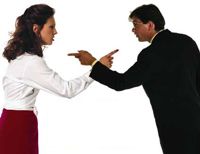 Civility is all the rage these days.
Civility is all the rage these days.
First Billy Dennis over at the newly-christened “Peoria Pundits” had to institute a civility policy (twice) because of escalating flame wars not only in the comments sections, but in the posts themselves. It was like “Lord of the Flies” for a while there.
Now, I see over at the Bloomington Pantagraph that they’ve had to do the same thing, except they may be a bit more aggressive than Billy:
So, beginning today, our screeners will not allow users to be rude, take pot shots at others or call names in comments posted on our site. Hopefully, this will change the tone of the conversation and keep people focused on a discussion of the issues and not calling each other “idiots” because they have misspelled a word or two.
They can afford to be more aggressive — they have screeners. They’ve gotten over 230 comments to their plea for civility saying polite and courteous things like, “Pantagraph, thank you so much for protecting my fragile emotions.” And, “Your [sic] just going to to take the fun out of the comments, that’s all. Guess I will head back to cnn.com….” See how well their new policy is working?
So far, I’ve only had a couple of instances where I had to ask commenters on The Peoria Chronicle to be civil (knock on wood). They’ve always complied; furthermore, most of my readers have been civil without having to be told, and for that, I thank you. I hope I never have to institute a civility policy, but I suppose it’s inevitable.
We’ll just enjoy our little utopia while we can.

I emailed the link to this post to Rick Wade.
Heh.
The blog host sets the tone, which is why your blog debates are mostly civil and Billy’s are… well… not always so civil.
the framers of the Bill of Rights would not oppose civility, but they certainly would consider this “civility policy” stuff, to coin a word, OFFENSIVE.
I certainly hope it is not inevitable for the Chronicle.
“but they certainly would consider this “civility policy†stuff, to coin a word, OFFENSIVE.”
I sincerely doubt that, since a blog is not a public square, it’s a publication. The Founding Fathers certainly understood the concept of editorial discretion.
“a blog is not a public square, it’s a publication. ”
I don’t think I would agree with that. It is both a publication and a public square. The law may not agree with that but then I would contend the law is still a long way from coming to grips with the underlying nature of the internet.
“The Founding Fathers certainly understood the concept of editorial discretion.”
The founding father certainly strove to be more sophisticated than the more common man, Having read some papers from back then, their discretion often tossed out the window. What is amazing is how trashy politics was even back then. Really things have not changed that much, just the technology.
“Having read some papers from back then, their discretion often tossed out the window. What is amazing is how trashy politics was even back then.”
My point wasn’t that it wasn’t trashy, my point was that the Founding Fathers understood the editor got to decide what trash went in. Different connotative meaning of the word discretion. 🙂 Editorial discretion as in deciding what runs, not as in having a modicum of taste.
Also, the fact that they wrote with feathers and parchment paper blends, probably made them more choosing of what goes into the papers or not.
Speaking behind someone’s back and THEN not having the guts to take responsibility for one’s own words is what got ME into uncivility mode.